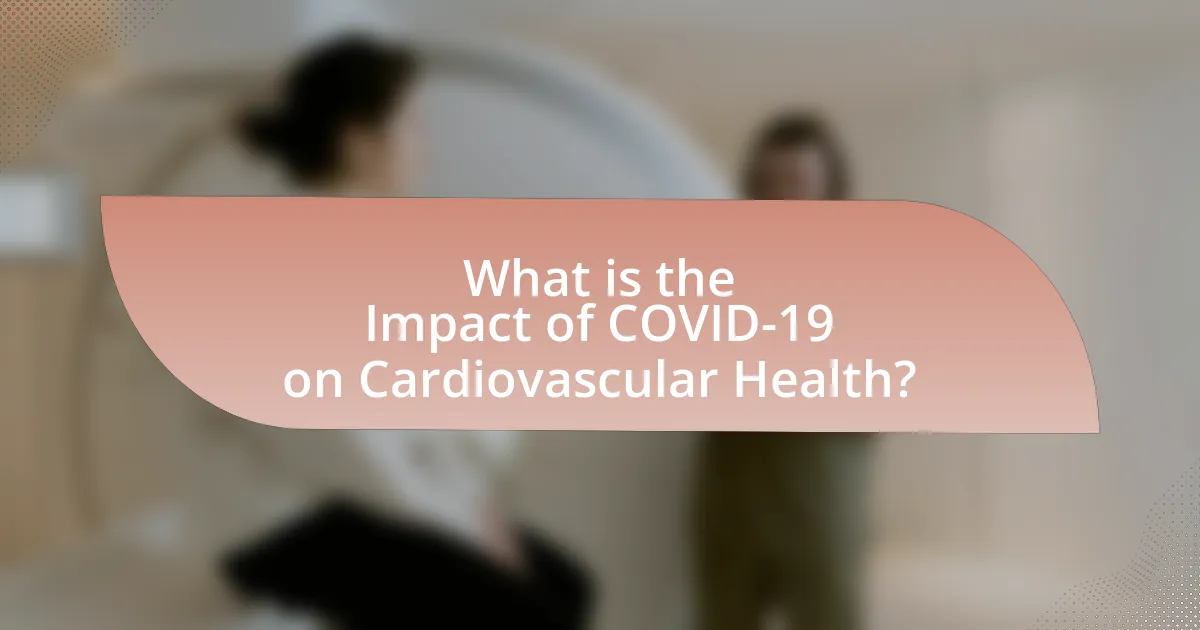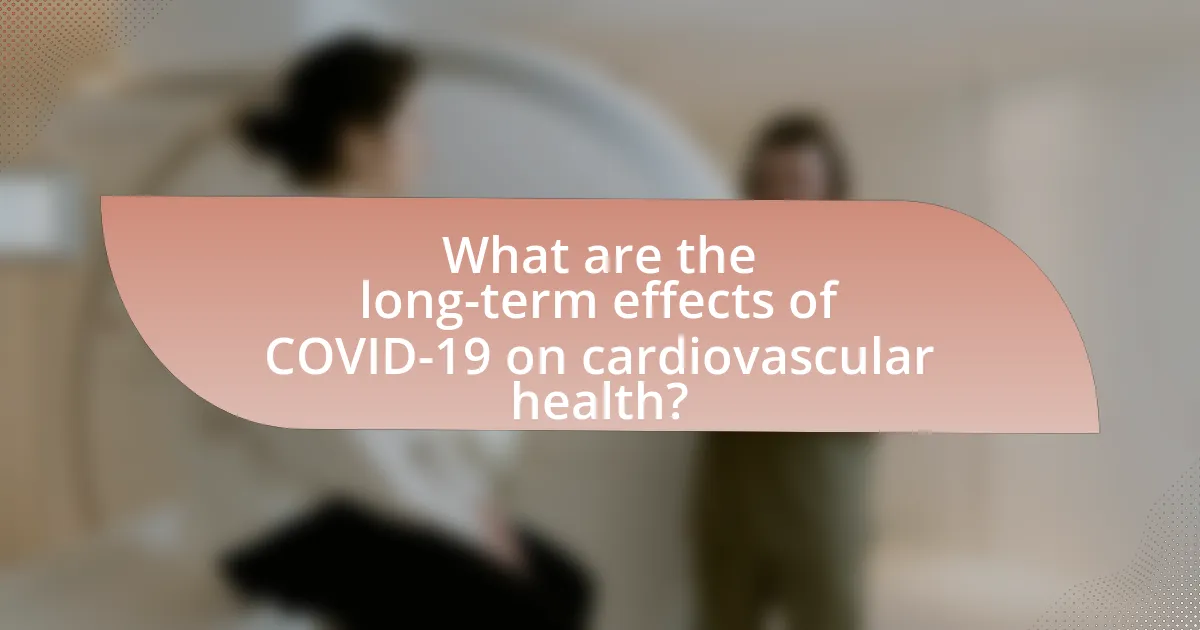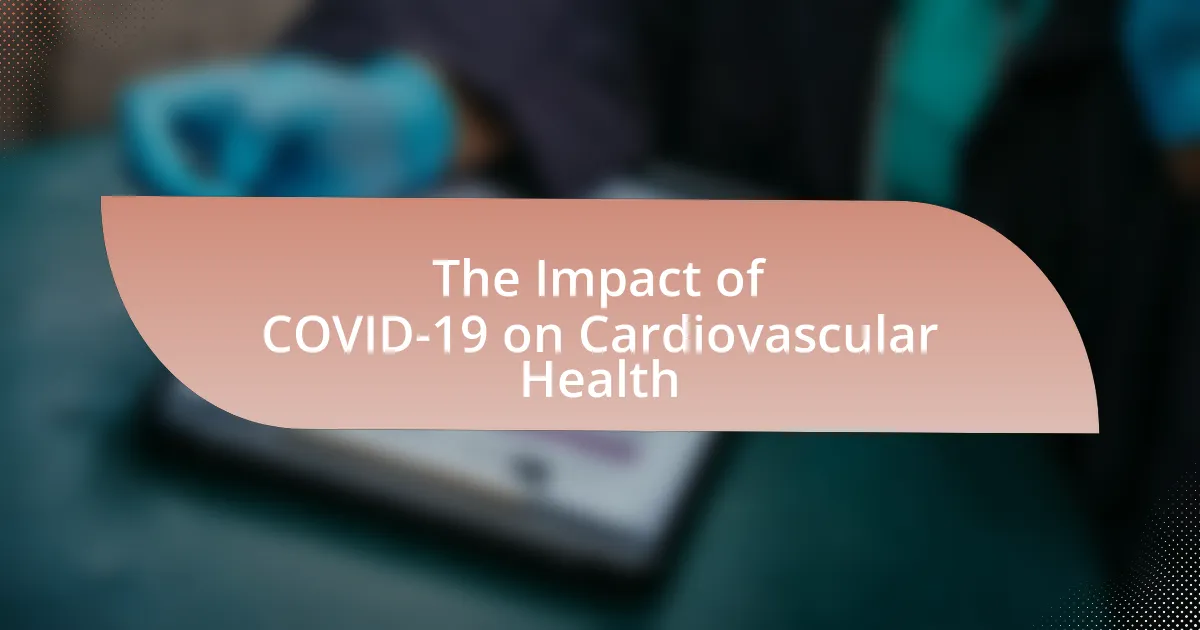The article examines the significant impact of COVID-19 on cardiovascular health, highlighting the increased risks of heart complications such as myocarditis, heart failure, and arrhythmias among infected individuals. It discusses how the virus exacerbates pre-existing cardiovascular conditions, leading to higher morbidity and mortality rates. Key findings from various studies indicate that approximately 20-30% of hospitalized COVID-19 patients experience cardiac injury, and the long-term effects may include persistent cardiovascular issues. The article also emphasizes the importance of maintaining cardiovascular health during the pandemic, particularly for vulnerable populations, and outlines preventive measures and lifestyle changes that can mitigate risks associated with COVID-19.

What is the Impact of COVID-19 on Cardiovascular Health?
COVID-19 significantly impacts cardiovascular health by increasing the risk of heart complications, including myocarditis, heart failure, and arrhythmias. Studies have shown that patients with COVID-19 are more likely to experience cardiovascular events, with a meta-analysis indicating that approximately 20-30% of hospitalized patients develop cardiac injury. Additionally, the virus can exacerbate pre-existing cardiovascular conditions, leading to higher morbidity and mortality rates among affected individuals. Research published in the Journal of the American College of Cardiology highlights that inflammation and hypoxia caused by COVID-19 can lead to direct damage to the heart muscle, further complicating recovery and long-term health outcomes.
How does COVID-19 affect the cardiovascular system?
COVID-19 significantly affects the cardiovascular system by increasing the risk of acute cardiovascular events, such as myocarditis, heart attacks, and thromboembolic complications. The virus can induce systemic inflammation and endothelial dysfunction, leading to vascular damage and increased clotting tendencies. Studies have shown that patients with COVID-19 are more likely to experience cardiovascular complications, with a meta-analysis indicating that approximately 20-30% of hospitalized patients exhibit cardiac injury. Additionally, the presence of pre-existing cardiovascular conditions can exacerbate the severity of COVID-19 outcomes, highlighting the interconnectedness of the virus and cardiovascular health.
What are the direct effects of COVID-19 on heart function?
COVID-19 directly affects heart function by causing inflammation of the heart muscle, known as myocarditis, and can lead to arrhythmias and heart failure. Studies have shown that patients with COVID-19 experience elevated levels of cardiac biomarkers, indicating myocardial injury. For instance, a study published in the Journal of the American College of Cardiology found that approximately 20-30% of hospitalized COVID-19 patients exhibited signs of cardiac injury, which correlates with worse clinical outcomes. Additionally, the virus can induce a hyper-inflammatory response, further compromising heart function and leading to complications such as thromboembolic events.
How does COVID-19 influence blood pressure and circulation?
COVID-19 can significantly influence blood pressure and circulation by causing inflammation and endothelial dysfunction. The virus triggers a systemic inflammatory response, which can lead to increased blood pressure due to heightened vascular resistance. Studies have shown that patients with COVID-19 often experience acute cardiovascular complications, including thrombosis and myocarditis, which further impair circulation. For instance, a study published in the Journal of the American College of Cardiology found that COVID-19 patients had a higher incidence of elevated blood pressure and cardiovascular events compared to non-infected individuals. This evidence underscores the direct impact of COVID-19 on cardiovascular health, particularly in relation to blood pressure and circulation.
Why is cardiovascular health important during a pandemic?
Cardiovascular health is crucial during a pandemic because individuals with pre-existing heart conditions face a higher risk of severe complications from viral infections, including COVID-19. Studies indicate that patients with cardiovascular disease are more likely to experience severe illness, hospitalization, and mortality when infected with the virus. For instance, research published in the Journal of the American College of Cardiology found that cardiovascular disease significantly increases the risk of adverse outcomes in COVID-19 patients, highlighting the importance of maintaining heart health to mitigate these risks.
What are the risks for individuals with pre-existing cardiovascular conditions?
Individuals with pre-existing cardiovascular conditions face heightened risks during COVID-19, including increased severity of illness, higher rates of hospitalization, and elevated mortality rates. Studies indicate that patients with cardiovascular diseases are more likely to experience complications such as acute respiratory distress syndrome and myocardial injury when infected with the virus. For instance, a study published in the Journal of the American College of Cardiology found that patients with underlying heart conditions had a significantly higher risk of severe outcomes, with mortality rates reaching up to 10% compared to 1% in the general population. These findings underscore the critical need for vigilant monitoring and preventive measures for this vulnerable group during the pandemic.
How does stress related to COVID-19 impact heart health?
Stress related to COVID-19 negatively impacts heart health by increasing the risk of cardiovascular diseases. Elevated stress levels can lead to heightened blood pressure, increased heart rate, and inflammation, all of which are detrimental to heart function. Research published in the Journal of the American College of Cardiology indicates that psychological stress can exacerbate existing heart conditions and contribute to the development of new cardiovascular issues. Furthermore, a study by the American Heart Association found that individuals experiencing high levels of stress during the pandemic reported a significant increase in heart-related symptoms, highlighting the direct correlation between stress and heart health.

What are the long-term effects of COVID-19 on cardiovascular health?
The long-term effects of COVID-19 on cardiovascular health include increased risk of heart inflammation, blood clotting, and long-term cardiovascular complications. Studies have shown that individuals who have recovered from COVID-19 may experience myocarditis, which is inflammation of the heart muscle, leading to potential heart failure or arrhythmias. Additionally, research indicates that COVID-19 can cause endothelial dysfunction, contributing to a higher likelihood of thromboembolic events, such as strokes. A study published in the Journal of the American College of Cardiology found that approximately 30% of patients discharged after hospitalization for COVID-19 had cardiovascular complications within six months. These findings underscore the significant and lasting impact COVID-19 can have on cardiovascular health.
How can COVID-19 lead to lasting cardiovascular issues?
COVID-19 can lead to lasting cardiovascular issues primarily through mechanisms such as inflammation, endothelial dysfunction, and direct viral invasion of heart tissues. Research indicates that the virus can trigger a hyper-inflammatory response, which damages blood vessels and promotes clot formation, increasing the risk of heart attacks and strokes. A study published in the Journal of the American College of Cardiology found that approximately 20-30% of COVID-19 patients experienced cardiovascular complications, including myocarditis and arrhythmias, even after recovery from the acute infection. Additionally, the presence of COVID-19 has been associated with long-term changes in heart function, as evidenced by cardiac MRI studies showing persistent myocardial inflammation in recovered patients.
What is the relationship between COVID-19 and myocarditis?
COVID-19 is associated with an increased risk of myocarditis, particularly following infection or vaccination. Studies indicate that myocarditis can occur as a complication of COVID-19, with data showing that the incidence is higher in younger males after mRNA vaccination compared to the general population. Research published in the Journal of the American College of Cardiology found that myocarditis cases were reported in approximately 1 in 5,000 vaccinated individuals, while COVID-19 infection itself has been linked to a significantly higher rate of myocarditis, with estimates suggesting that the risk may be as high as 16 times greater than in uninfected individuals.
How does COVID-19 contribute to the development of heart disease?
COVID-19 contributes to the development of heart disease primarily through inflammation and damage to the cardiovascular system. The virus can induce a hyper-inflammatory response, leading to myocarditis, which is inflammation of the heart muscle, and can also exacerbate existing cardiovascular conditions. Studies have shown that COVID-19 patients exhibit elevated levels of inflammatory markers, such as C-reactive protein and interleukin-6, which are associated with increased cardiovascular risk. Additionally, the virus can cause endothelial dysfunction, which impairs blood vessel function and promotes atherosclerosis, further increasing the likelihood of heart disease.
What populations are most at risk for long-term cardiovascular effects?
Populations most at risk for long-term cardiovascular effects include individuals with pre-existing cardiovascular conditions, older adults, and those with comorbidities such as diabetes, obesity, and hypertension. Research indicates that COVID-19 can exacerbate these conditions, leading to increased risks of heart complications. For instance, a study published in the Journal of the American College of Cardiology found that patients hospitalized with COVID-19 had a significantly higher incidence of cardiovascular events, including myocarditis and heart failure, particularly among older adults and those with underlying health issues.
How do age and comorbidities influence cardiovascular outcomes post-COVID-19?
Age and comorbidities significantly influence cardiovascular outcomes post-COVID-19, with older individuals and those with pre-existing health conditions experiencing worse outcomes. Research indicates that older adults are at a higher risk for severe cardiovascular complications due to age-related physiological changes and the presence of multiple comorbidities, such as hypertension, diabetes, and obesity, which exacerbate the effects of COVID-19. A study published in the Journal of the American College of Cardiology found that patients over 65 years old with comorbid conditions had a 2.5 times higher risk of cardiovascular events compared to younger, healthier individuals. This correlation underscores the critical role that age and comorbidities play in determining the severity of cardiovascular issues following COVID-19 infection.
What role does gender play in cardiovascular health post-COVID-19?
Gender significantly influences cardiovascular health post-COVID-19, with studies indicating that women may experience different cardiovascular outcomes compared to men. Research has shown that women are more likely to develop long-term cardiovascular complications after COVID-19, such as myocarditis and heart failure, due to hormonal differences and immune responses. For instance, a study published in the Journal of the American College of Cardiology found that women had a higher incidence of post-acute sequelae of SARS-CoV-2 infection (PASC), which includes cardiovascular issues, compared to men. Additionally, men generally exhibit higher rates of severe COVID-19 outcomes, but women often report more persistent symptoms, including those affecting cardiovascular health. This gender disparity highlights the need for tailored cardiovascular care and monitoring for both men and women in the post-COVID-19 context.

What preventive measures can be taken to protect cardiovascular health during COVID-19?
To protect cardiovascular health during COVID-19, individuals should prioritize maintaining a healthy lifestyle, including regular physical activity, a balanced diet, and effective stress management. Engaging in at least 150 minutes of moderate-intensity exercise weekly can help reduce cardiovascular risks, as supported by the American Heart Association’s guidelines. Additionally, consuming a diet rich in fruits, vegetables, whole grains, and lean proteins can lower blood pressure and cholesterol levels, which are critical for heart health.
Furthermore, managing stress through mindfulness practices, such as meditation or yoga, can mitigate the adverse effects of stress on the cardiovascular system. Regular health check-ups and monitoring blood pressure and cholesterol levels are also essential preventive measures, as early detection of issues can lead to timely interventions. These strategies collectively contribute to better cardiovascular health during the pandemic, as evidenced by numerous studies linking lifestyle factors to heart disease outcomes.
How can individuals manage their cardiovascular health during the pandemic?
Individuals can manage their cardiovascular health during the pandemic by maintaining a balanced diet, engaging in regular physical activity, and monitoring their health metrics. A balanced diet rich in fruits, vegetables, whole grains, and lean proteins supports heart health, while regular physical activity, such as walking or home workouts, can help maintain cardiovascular fitness. Monitoring health metrics, including blood pressure and cholesterol levels, is crucial, as studies indicate that individuals with pre-existing cardiovascular conditions are at higher risk for severe COVID-19 outcomes. According to research published in the Journal of the American College of Cardiology, individuals with cardiovascular disease have a significantly increased risk of hospitalization and mortality from COVID-19, emphasizing the importance of proactive health management during this time.
What lifestyle changes can support heart health during COVID-19?
To support heart health during COVID-19, individuals should adopt a balanced diet, engage in regular physical activity, manage stress effectively, and ensure adequate sleep. A balanced diet rich in fruits, vegetables, whole grains, and lean proteins can lower cholesterol and blood pressure, which are crucial for cardiovascular health. Regular physical activity, such as at least 150 minutes of moderate exercise per week, helps maintain a healthy weight and improves heart function. Effective stress management techniques, including mindfulness and meditation, can reduce the risk of heart disease, as chronic stress is linked to increased cardiovascular risk. Lastly, obtaining 7-9 hours of quality sleep per night is essential, as poor sleep is associated with higher rates of heart disease. These lifestyle changes are supported by research indicating that diet, exercise, stress management, and sleep quality significantly influence cardiovascular health outcomes.
How important is regular medical check-up during the pandemic?
Regular medical check-ups during the pandemic are crucial for maintaining overall health and managing chronic conditions. These check-ups help in early detection of potential health issues, including cardiovascular problems, which may be exacerbated by COVID-19. Research indicates that individuals with pre-existing cardiovascular conditions are at a higher risk of severe illness from the virus, making regular monitoring essential for timely interventions. According to a study published in the Journal of the American College of Cardiology, patients with cardiovascular disease who received consistent medical care during the pandemic had better health outcomes compared to those who delayed or avoided check-ups.
What resources are available for individuals concerned about cardiovascular health?
Individuals concerned about cardiovascular health can access various resources, including educational websites, support groups, and healthcare services. The American Heart Association provides comprehensive information on heart disease, prevention strategies, and lifestyle changes. Additionally, the Centers for Disease Control and Prevention offers guidelines and statistics related to cardiovascular health, emphasizing the importance of regular check-ups and screenings. Local hospitals and clinics often have specialized programs for heart health management, including nutrition counseling and exercise programs. These resources are essential for individuals seeking to improve their cardiovascular health and mitigate risks associated with conditions exacerbated by COVID-19.
How can telehealth services assist in managing cardiovascular health during COVID-19?
Telehealth services can assist in managing cardiovascular health during COVID-19 by providing remote monitoring, virtual consultations, and access to healthcare professionals without the need for in-person visits. These services enable patients to receive timely medical advice, adjust medications, and monitor vital signs such as blood pressure and heart rate from home, reducing the risk of exposure to the virus. A study published in the Journal of the American College of Cardiology found that telehealth interventions improved patient engagement and adherence to treatment plans, which is crucial for individuals with cardiovascular conditions during the pandemic.
What are the best practices for maintaining cardiovascular health during a pandemic?
To maintain cardiovascular health during a pandemic, individuals should prioritize regular physical activity, a balanced diet, stress management, and routine health check-ups. Engaging in at least 150 minutes of moderate aerobic exercise weekly can help reduce the risk of cardiovascular diseases, as supported by the American Heart Association’s guidelines. Consuming a diet rich in fruits, vegetables, whole grains, and lean proteins while limiting processed foods and sugars is essential for heart health, as evidenced by numerous studies linking diet to cardiovascular outcomes. Additionally, managing stress through mindfulness practices, such as meditation or yoga, can lower blood pressure and improve heart health, according to research published in the Journal of the American College of Cardiology. Lastly, maintaining regular health check-ups ensures early detection and management of any cardiovascular issues, which is crucial during times of increased health risks.


